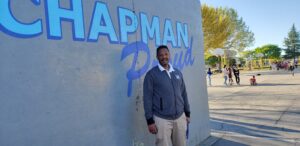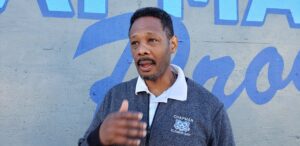by Natalie Hanson
posted March 23
As the pandemic disrupted Chico’s Chapman neighborhood, Chapman Elementary School Principal Mike Allen was one of several local school leaders known to knock on students’ doors and check on them, often with food in hand.

The schools were closed by state mandate with only online learning from March through August 2020, meaning that children missed seven months of in-person education. In October 2020, Chico Unified adopted a hybrid model. In August 2021, campuses fully opened to in-person learning.
Two years later, with his school’s campus reopened, Allen says students are facing great obstacles. Some are missing classes after losing momentum during online classes. Many are struggling with social and economic pressures exacerbated by the pandemic.
Allen said as children try to balance instabilities at home with demands on campus, teachers and staff often find themselves to be key lifelines to basic needs and resources.
The county scores high on measurements of California’s children with multiple Adverse Childhood Experiences Scores (ACES). According to California Dashboard data, this year Chico Unified School District reported 50% of its students are socioeconomically disadvantaged. Chapman Elementary’s students are nearly 92% economically disadvantaged, up from 81% in 2019.
When children were learning at home, “We were making sure we were making connections,” Allen said. “Now, it’s about getting resources to families.”

“I have great teachers,” Allen added. “They’re working their tails off to get these kids caught back up and that’s a difficult challenge.’’
His concerns are shared by educators across the state. Schools across America are faced with increasing numbers of children falling behind on state educational standards, and policy institutes are suggesting new approaches to address the pandemic’s impacts on childrens’ education, health and stability.
Speakers convened by Ethnic Media Services last week said connecting schoolwork with career pathways and bringing art and music education back to the classroom, as well as strengthening the community school model, will all help children readjust.
Louis Freedberg, past executive director of EdSource, said schools are key not just for learning, but for developing social and emotional skills and helping some children meet basic nutritional and other needs.
Freedberg said schools and their districts must be held accountable for where new streams of federal aid funding totaling $190 billion nationwide, including American Rescue Act dollars, are going.
Asked how rural areas like Chico can best utilize these funds when they arrive, Freedberg stressed that there has never been a greater opportunity to use large amounts of funding that are earmarked for underprivileged areas.
“That money needs to be targeted where it really makes a difference,” he said.
Hayin Kimner, managing director for the Community Schools Learning Exchange, said the community schools approach is one example starting to catch on in more cities and counties, such as in Anaheim and Oakland. Kimner said schools and districts which operate with a community-focused mindset – working with teachers, students and families and partnering with community agencies and local government – can better align resources behind the goal of improving student outcomes.
“All schools can be community schools,” Kimner said. “This is about reframing and putting forward the central importance of students and relationships as part of doing these programs and strategies. Without those trusting relationships in place, we will not get to where we need to be both in terms of pandemic recovery, as well as public education transformation.”
Allison Socol of Ed Trust encouraged the use of the term “unfinished learning” to shift the focus away from blaming students.
Socol said schools must improve children’s ability to “catch up” with strong relationships with leaders at school, combined with targeted tutoring and expanded learning time.
“All students can learn with the right supports and relationships with adults,” she said. “Schools can absolutely address unfinished learning, and investment from the federal government is an unprecedented opportunity.”
Allen said Chapman Elementary’s work to reach families in need and connect them to resources has continued with children back on campus. Students are struggling with a variety of outside pressures; in some cases parents have lost jobs and in other cases families are facing food insecurity, divorce or other disruptors.
“We just didn’t have access to kids to see if they were having issues,” Allen said. “And now that we have them all day, we get to see them longer and get them to open up to us.”

Teachers are finding that younger students need an adjustment period that prior to the pandemic would have taken place sooner. And the multiple pressures the pandemic has produced are leading to “more troubling” behavioral issues. This trend is higher among younger students in the first and second grades, or students who have a history of transient status – not being present for weeks or months at a time.
Allen said they’re seeing behavior that is “very extreme, more extreme than we’re even used to,” referring to students who shout, run, or defy teachers on school grounds.
“They had limited kindergarten … didn’t have the training of playing on the playground and dealing with their peers. And they don’t have the endurance it takes to be in a classroom all day working.”
Allen said there has been an increase in cases that had to be directed to Child Protective Services, with several occurring in the past year. He thinks child homelessness in Chico has increased in the past year, and knows families who live in various homes or “double up” to save money due to losing a job. Those who did get re-employed need childcare support, and there is a waiting list for children needing the after-school program or transportation to and from the school.
Chico Unified School District board President Dr. Kathleen Kaiser said now that free school meals for children are ensured, social and emotional support is a major part of helping children transition back into in-person education. She said that counselors are now at every campus, thanks to new funding streams received during the pandemic.

“We have seen a very positive response to having more of the emotional support personnel on campuses, recognizing that kids are struggling for various reasons,” Kaiser said. “For a lot of students at all ages, school is where there is excitement about learning, but also consistency in a range of approaches.”
“The risk to kids and teachers was too great with no sanctioned vaccines” — Kathleen Kaiser
“Absolutely closing campuses created difficulties for everyone, but the risk to kids and teachers was too great with no sanctioned vaccines for kids in the youngest age groups,” Kaiser added. “A healthy kid is going to be far more successful than one whose health has been severely compromised.”
She and school board member Eileen Robinson said targeted case managers at every school are also key to connecting children to resources as quickly as possible.
Robinson said the district is working “to make sure we’re spending the money where it was targeted for, to make sure we don’t get fined and (have) the money pulled back.”
“Chapman has a number of families that are housing insecure and so we work very hard to make sure that our families are aware of how to get on the housing list,” Robinson said.
“It’s up to us as the adults … to do as much as possible to give them a secure basis to be a kid and get to school regularly – with a mindset and an emotional level that makes it easy to learn once you get to school.”
Allen said the school district has worked hard to get extra resources to the students, including extra teachers, counselors and aides and allowing small classroom sizes. “I think that we can see the light at the end of the tunnel.”
Natalie Hanson previously worked as a journalist in Chico and now reports for the Marin Independent Journal at Bay Area News Group.

It’s really sad to me that the pandemic has caused a lot of kids to fall back in their school studies and socializing. But I’m glad the kids at Chapman Elementary have Principle Mike Allen to look out for them.
Great story. Thank you Natalie Hansen and ChicoSol.